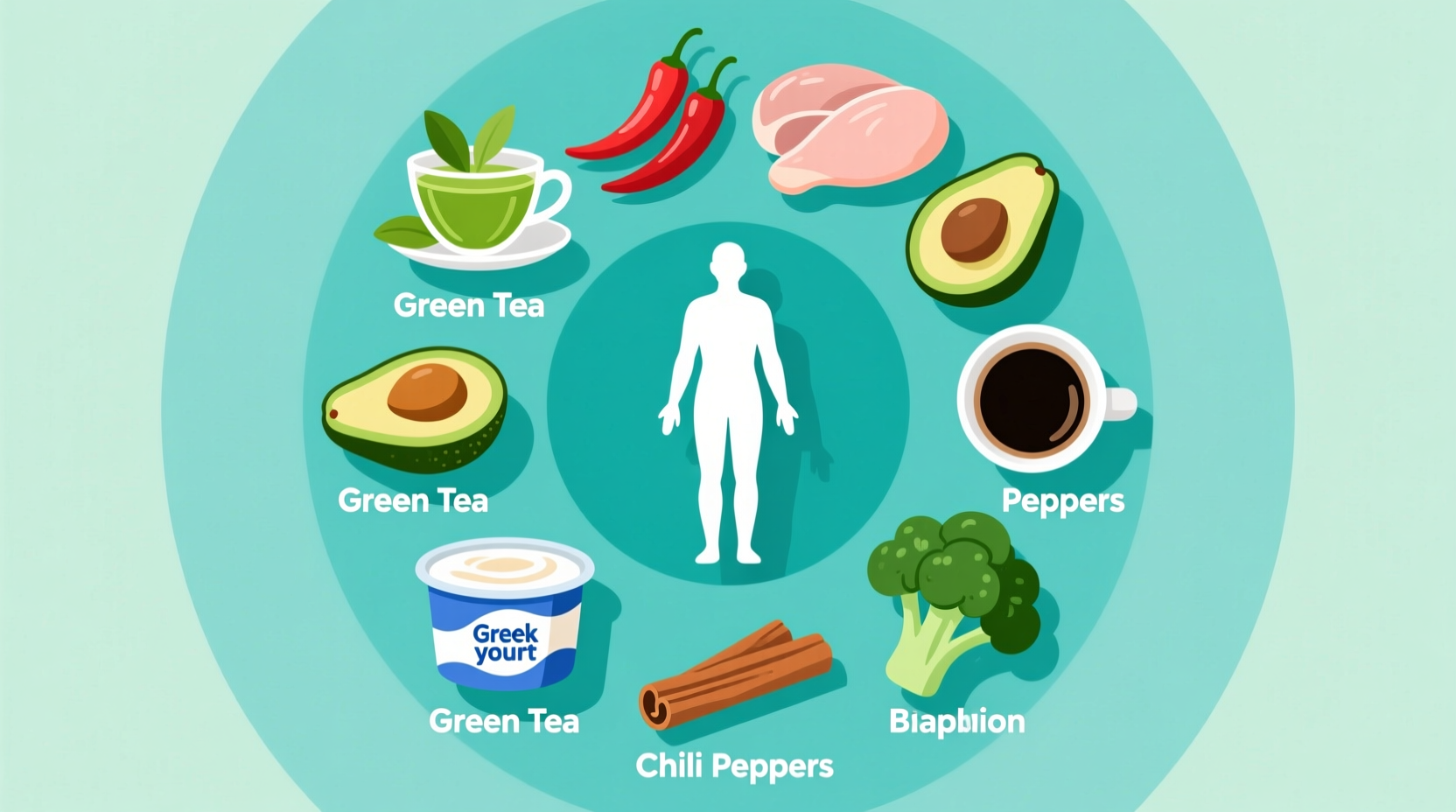Green tea, protein-rich foods, chili peppers, coffee, and water are scientifically proven to modestly boost metabolism. These foods increase thermogenesis by 3-10%, but effects are temporary and should complement—not replace—exercise and balanced nutrition for meaningful metabolic improvement.
Many people search for "magic" metabolism boosters, but the reality is more nuanced. While no food dramatically transforms your metabolic rate, certain options provide measurable, science-backed benefits when incorporated into a healthy lifestyle. Understanding which foods actually work—and how much they help—is crucial for setting realistic expectations.
Understanding Metabolism and Food's Role
Your metabolism represents all chemical processes that maintain life, including converting food to energy. The thermic effect of food (TEF) accounts for approximately 10% of daily energy expenditure—the calories burned during digestion, absorption, and nutrient processing. Different foods trigger varying TEF responses, creating opportunities for modest metabolic enhancement.
| Food Category | Thermic Effect | Mechanism | Duration of Effect |
|---|---|---|---|
| Protein | 20-30% of calories | Complex digestion process | 3-4 hours |
| Carbohydrates | 5-10% of calories | Glucose processing | 2-3 hours |
| Fats | 0-3% of calories | Simple absorption | 1-2 hours |
| Green Tea | 3-4% increase | Catechins + caffeine synergy | 90-120 minutes |
This thermic effect comparison, based on research from the American Journal of Clinical Nutrition, shows why protein-rich foods create the most significant metabolic bump. However, no single food dramatically alters your overall metabolic rate—these effects are temporary and modest.
Top Science-Backed Metabolism-Boosting Foods
Protein-Packed Options
Foods high in protein—such as lean meats, fish, eggs, and legumes—require substantially more energy to process than fats or carbohydrates. Consuming 30 grams of protein can temporarily increase calorie burn by 20-30% of those calories. A Harvard T.H. Chan School of Public Health analysis confirms that higher protein intake supports both metabolism and muscle preservation during weight loss.
Green Tea and Matcha
Green tea contains epigallocatechin gallate (EGCG), which works synergistically with caffeine to enhance fat oxidation. Research published in the International Journal of Obesity shows that regular green tea consumption can increase energy expenditure by approximately 3-4%. Matcha, with its higher EGCG concentration, provides even greater potential benefits.

Chili Peppers and Capsaicin
Capsaicin, the compound that makes chili peppers hot, temporarily increases metabolic rate by about 50 calories per day according to a Physiology & Behavior study. This effect occurs through activation of transient receptor potential (TRP) channels, which stimulate heat production. Incorporating cayenne, jalapeños, or other spicy peppers into meals creates this temporary metabolic bump.
Coffee and Caffeine
Moderate coffee consumption (3-4 cups daily) can increase metabolic rate by 3-11%, with greater effects in lean individuals versus those with obesity, as documented by research in the Journal of Functional Foods. The effect peaks 60-90 minutes after consumption and gradually declines over several hours.
Water, Especially Cold Water
Drinking 500ml of water increases resting energy expenditure by 24-30% for 60-90 minutes, per a Journal of Clinical Endocrinology and Metabolism study. The body expends energy warming the water to body temperature, creating a small but measurable metabolic boost.
Realistic Expectations: Context and Limitations
It's crucial to understand the context boundaries of metabolism-boosting foods. Their effects are:
- Temporary (typically lasting 1-3 hours)
- Modest (usually 3-10% increase in calorie burn)
- Supplementary (must complement exercise and healthy eating)
- Individual (effects vary based on age, weight, and metabolic health)
These foods won't overcome significant calorie excess or replace the metabolic benefits of muscle mass. As the National Institutes of Health emphasizes, building muscle through resistance training provides substantially greater metabolic benefits than any single food.
Practical Implementation Guide
Maximize benefits by strategically incorporating these foods throughout your day:
Morning Routine
Start with a glass of cold water followed by coffee or green tea. Include protein in your breakfast—eggs, Greek yogurt, or a protein smoothie—to leverage the higher thermic effect early in the day.
Lunch and Dinner Strategies
Add chili peppers to meals for the capsaicin effect. Choose lean protein sources like chicken, fish, or legumes as your main component. Include green tea with meals rather than sugary beverages.
Smart Snacking
Opt for protein-rich snacks like cottage cheese, nuts, or hard-boiled eggs instead of carbohydrate-heavy options. This approach maintains a higher thermic effect throughout the day.
What Doesn't Work: Debunking Myths
Despite popular claims, these approaches lack scientific backing:
- "Detox" teas and supplements—Most provide minimal metabolic benefit beyond caffeine content
- Grapefruit diets—No special metabolic properties beyond general fruit nutrition
- Extreme "metabolism boosters"—No food dramatically increases metabolism long-term
The Federal Trade Commission has taken action against numerous companies making exaggerated claims about metabolism-boosting supplements, emphasizing that sustainable metabolic health comes from comprehensive lifestyle approaches.
More Impactful Metabolic Factors
While certain foods provide modest boosts, these factors influence metabolism more significantly:
- Muscle mass—Each pound of muscle burns approximately 6 calories daily at rest, compared to 2 calories for fat tissue
- Sleep quality—Poor sleep reduces metabolic rate and increases hunger hormones
- Stress management—Chronic stress elevates cortisol, which can slow metabolism
- Overall diet quality—Nutrient-dense whole foods support metabolic health better than isolated "boosters"
Think of metabolism-boosting foods as supporting actors in your metabolic health strategy, not the leading role. Their benefits compound when integrated into a comprehensive approach that prioritizes protein intake, regular movement, quality sleep, and stress management.











 浙公网安备
33010002000092号
浙公网安备
33010002000092号 浙B2-20120091-4
浙B2-20120091-4